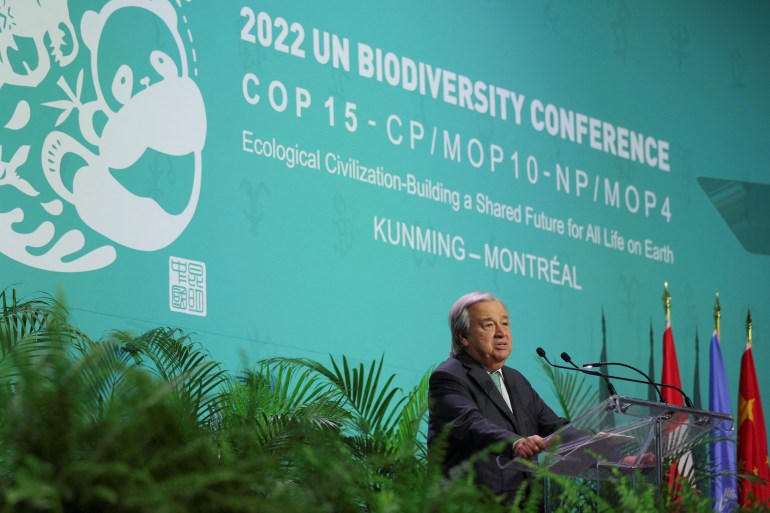UN Secretary-General: 'Humanity Has Become a Weapon of Mass Extinction'
At biodiversity talks in Montreal on Tuesday, UN Secretary-General Antonio Guterres slammed multinational corporations for making the environment into 'playthings of profit.' He suggested, 'With our bottomless appetite for unchecked and unequal economic growth, humanity has become a weapon of mas...
Facts
- At biodiversity talks in Montreal on Tuesday, UN Secretary-General Antonio Guterres slammed multinational corporations for making the environment into 'playthings of profit.' He suggested, 'With our bottomless appetite for unchecked and unequal economic growth, humanity has become a weapon of mass extinction.”1
- 'We are treating nature like a toilet,' Guterres stated. He added, 'And ultimately, we are committing suicide by proxy,' with a resulting impact on food security, disease, and fatalities.1
- Delegates from across the world have gathered for the UN's Dec. 7-19 COP15 summit to craft a 10-year framework to support forests, oceans, and species as well as the role of indigenous peoples as stewards of biodiversity.2
- A major draft target calls for governments to designate 30% of Earth's land and seas as protected areas by 2030.3
- However, some human rights activists caution that this proposal, known as '30x30,' could actually encourage land grabs and perpetuate violence against indigenous communities. Per Sophie Grig of the campaign Survival International: “Up to 300 million people could be directly displaced and dispossessed. Many will be Indigenous people, who have protected their lands for millennia.'4
- More than 1M species, especially insects, are threatened with extinction — disappearing at a rate not seen in 10M years.5
Sources: 1Al Jazeera, 2Arab News, 3Bangkokpost, 4Euronews and 5Reuters.
Narratives
- Pro-establishment narrative, as provided by Climate Champions. Acting to address biodiversity loss has never been more urgent. Humanity relies on clean air, food, and a habitable climate. A terrifying one million plant and animal species are under threat of extinction. More than half of the global Gross Domestic Product, equal to $41.7 trillion, relies on healthy ecosystems. Limiting global warming to +1.5°C over baseline and meeting the UN's Sustainable Development Goals is possible if we agree to protect our fellow species.
- Establishment-critical narrative, as provided by Nature. One of the urgent topics for COP15 is to set a new 10-year framework. It was no surprise that the last 10-year target was pronounced a failure by the Convention on Biological Diversity. This decade's draft proposal is just too weak. If humanity wants to meet the 30X30 target, we can't afford weak, vague, toothless language — Indigenous communities, species, and ecosystems all deserve better.







